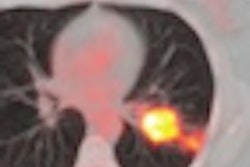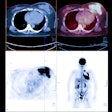With two nuclear reactors again producing molybdenum-99 (Mo-99), officials at SNM of Reston, VA, say supplies of the medical isotope are returning to normal in North America, but long-term production remains a critical issue.
"There is a long-term worry," said Michael Graham, MD, PhD, past president of SNM and director of nuclear medicine at the University of Iowa in Iowa City. "We still don't have a national supply and we're still relying on foreign reactors."
Supplies of Mo-99 were severely restricted starting in May 2009 when Atomic Energy of Canada's (AECL) National Research Universal nuclear reactor in Chalk River, Ontario, went offline for repairs. Shortly thereafter, Nuclear Research and Consultancy Group's (NRG) High Flux Reactor (HFR) in Petten, the Netherlands, was also taken offline. The facilities returned to service in the past month and again are producing Mo-99.
Mo-99 is the precursor isotope to technetium-99m, one of the most widely used radioisotopes in nuclear medicine. During the supply crisis, imaging facilities were forced to postpone technetium procedures or use alternative isotopes instead. Each year, more than 16 million people in the U.S. undergo procedures using small amounts of technetium-99m, according to SNM.
Maintaining focus
SNM officials are trying to keep the focus on the Mo-99 situation even as supplies return to normal. Both the NRU and HFR reactors are about 50 years old and will soon reach the end of the line. The Canadian government and AECL plan to shut down the NRU facility in 2016, while NRG is developing its new Pallas nuclear reactor and is determining where to site the facility.
"[NRG] can't build it until they [site it], and building a reactor is not a trivial process," Graham said in an interview with AuntMinnie.com. "We expect it to be at least five years and probably even seven years before something is up and running. If the Canadians follow through, they will have shut down [NRU] long before the Pallas reactor is up and running."
Graham also predicted it would be next year before there is any congressional action on the American Medical Isotopes Production Act (HR 3276), which has languished in the U.S. Senate following overwhelming approval in the House in November 2009.
The bill allocates as much as $160 million to help fund U.S. production of Mo-99 and gradually eliminates the export of highly enriched uranium. However, Sen. Christopher Bond (R-MO) has blocked the bill's progress, asserting that the proposal could have the opposite result.
One facility that is planning to develop a U.S. source for isotope production is the University of Missouri Research Reactor (MURR), which hopes to build a reactor that could produce enough molybdenum-99 to meet half the U.S. demand.
Bond's term expires in January, and he has chosen not to run for re-election.
"Sen. Bond and his office are holding it up, and there is no sign that they are going to release it," Graham said. "Our view at the moment is we will probably have to wait until he leaves the Senate. We have seen no indication that he is interested in any real meaningful discussion of what could be done to move things forward. So we are in this position that we are just going to wait."
Despite the obstacles, Graham said, the Mo-99 shortage over the past 16 months was handled "remarkably well and it isn't just luck. There has been an extraordinary degree of international collaboration between the reactor operators and the generator manufacturers. It's a nice example of how it can be done right."
He added that the University of Iowa again is receiving two generators per week, as it did before the Mo-99 shortage. "We're also getting iodine-131 as we used to before, but it may take a little while longer to be back to normal levels nationally."
By Wayne Forrest
AuntMinnie.com staff writer
September 17, 2010
Related Reading
Covidien warns of Tc-99m shortfall, September 2, 2010
AECL's NRU resumes operation, September 2, 2010
Report: Senator delays isotope bill, July 23, 2010
SNM: Long-term Mo-99 problems remain, July 8, 2010
SNM: 1 year later, Mo-99 shortage 'a lot worse,' June 8, 2010
Copyright © 2010 AuntMinnie.com




















